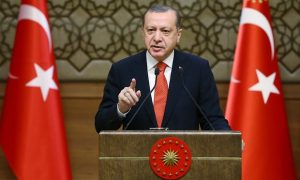Editorial The Guardian
But Turkey is a country racked by multiple traumas. A shaken nation lives in the fear that more violence may befall it in 2017, as it grapples with internal strife and the fallout from war and chaos in the Middle East. The trauma of terrorism exists alongside that of large-scale political repression in the aftermath of July’s coup attempt, as well as tensions created by coping (often remarkably, at a human level) with the arrival of an estimated 3 million refugees in recent years. These forces are of course of different natures and dimensions; they should not be conflated with one another, nor automatically connected. But to grasp the immense pressure Turkish citizens are under, it is important to keep them all in mind. In any country, any one of these would be a massive challenge; taken together, they amount to a rare test, putting a highly polarised nation at an important, possibly decisive, crossroads.
That the Reina nightclub attack occurred in a city of rich, cosmopolitan history and numerous tourist sites, and that the victims were of 14 different nationalities, only enhanced the global resonance of the event. Isis said a “heroic soldier of the caliphate” had targeted a place where “Christians were celebrating their pagan feast”. The assailant, the group said, had acted “in revenge for God’s religion” because Turkey was “the servant of the cross”. In the run-up to the attack the Turkish army had been heavily engaged in northern Syria, where it battles Isis as well as Kurdish armed groups.
Turkey’s recent policy shift in the Middle East, marked by a sudden alignment with Russia in facilitating the fall of rebel-held Aleppo, will have increasingly placed it in the firing line of a group that likes to claim it defends Sunni Muslim populations – all the while persecuting them. But the danger that Isis represents for Turkey predated this change in alliances, the principal motivation for which can be found in Ankara’s determination to curtail Kurdish territorial ambitions throughout the region.
Turkey’s paranoid, autocratic president and his administration hardly warrant sympathy. More than 140 writers, journalists and intellectuals are imprisoned. Social media users are increasingly being investigated. Legal proceedings have begun against 80,000 people nationwide, in what amounts to massive purges. Last week another political trial got under way, involving the novelist Aslı Erdoğan. Turkey’s relations with western allies have been strained as a result of the president’s human rights record as well as policy divergences in the Middle East.
It is easy, when looking at a country in the grip of authoritarianism, to see just the despot and not the millions of citizens who populate the land in all their diversity and with all their aspirations. One man captures all the attention because he is deemed to control so much – and, indeed, his power is unrelenting. But as a nation mourns its dead, one way to manifest solidarity is to remember that despite the pressures there remains a vivid civil society in Turkey, aspiring to democracy, openness and tolerance, not hatred and divisiveness, and it is showing much courage. The scale of the country’s simultaneous and multiple traumas make that spirit of resistance all the more admirable, especially when tragedy strikes. This citizens’ courage deserves not just our empathy but our active support.
https://www.theguardian.com/commentisfree/2017/jan/04/the-guardian-view-on-turkey-multiple-traumas-immense-courage?CMP=share_btn_fb




